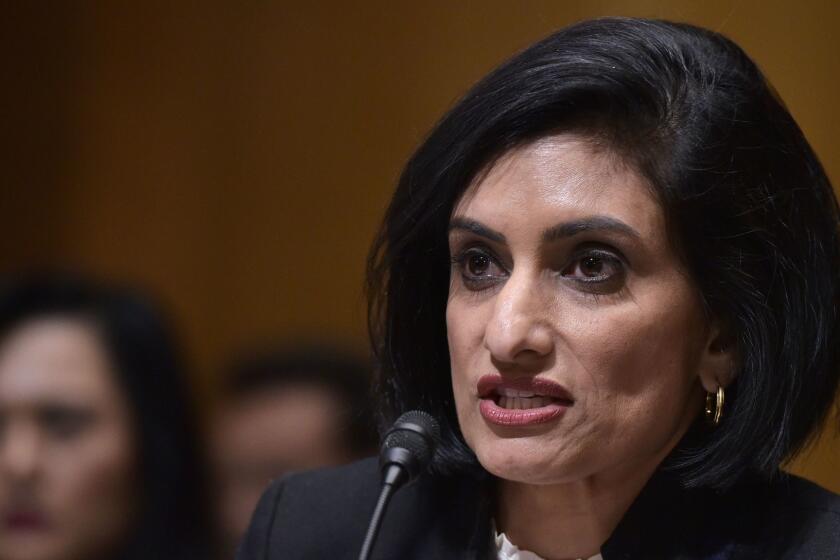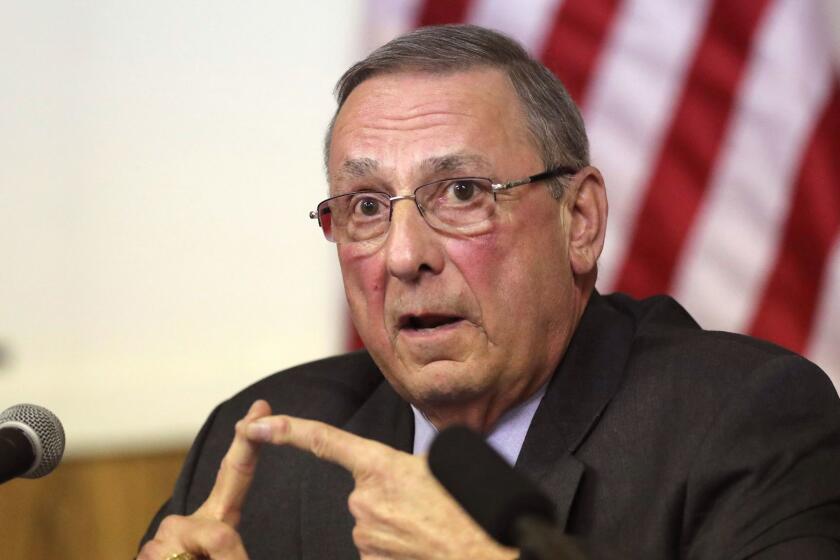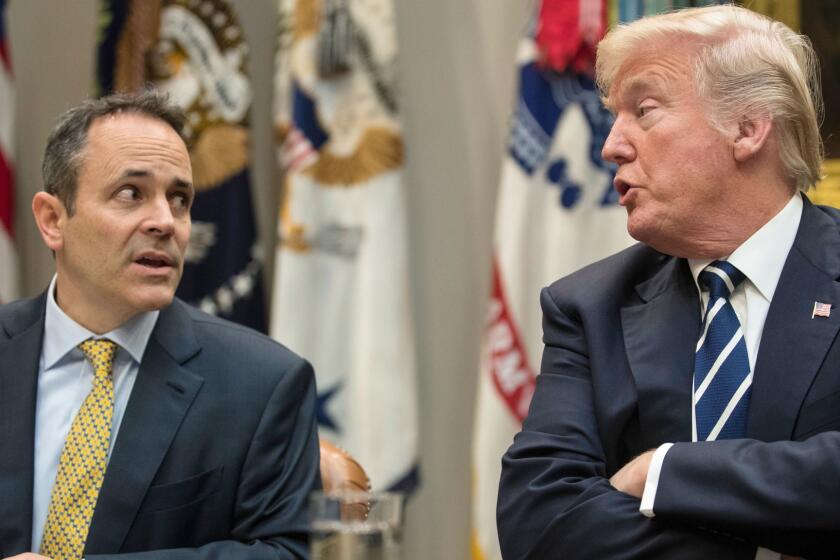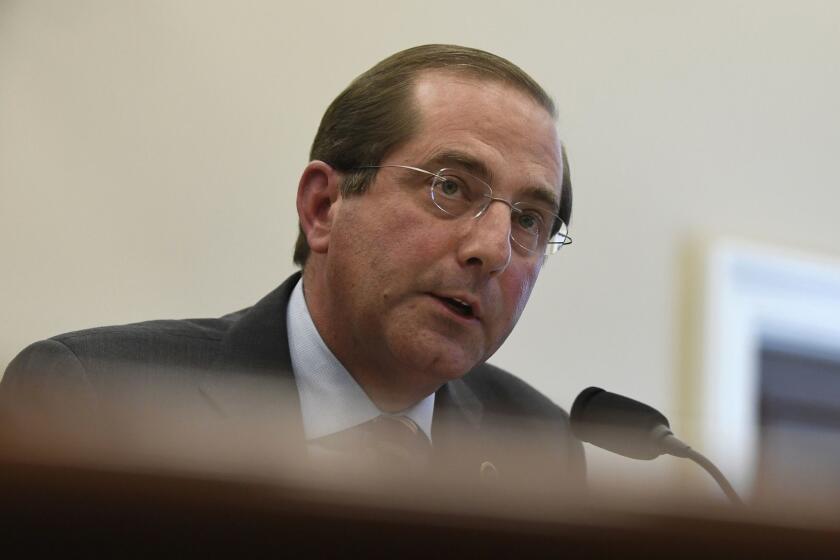Column: Medicare boss Seema Verma is a threat to public health
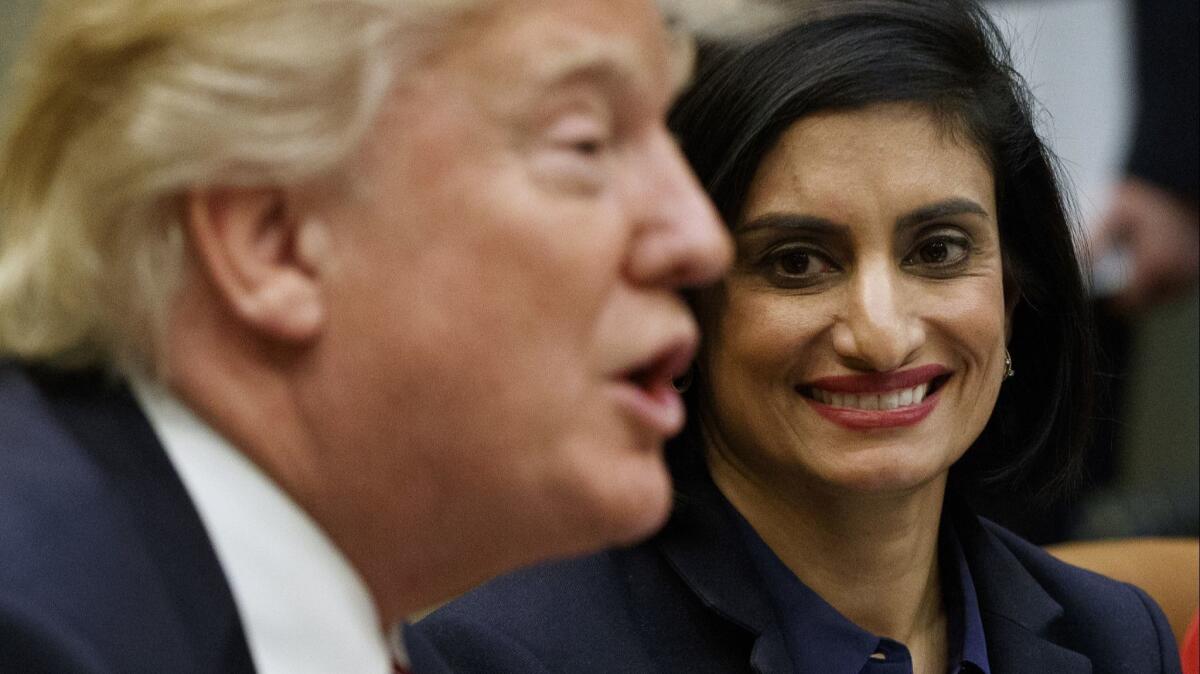
Seema Verma, the federal official in charge of Medicare, Medicaid and the Affordable Care Act, has blasted into the limelight after more than two years operating in the shadows of the Department of Health and Human Services.
And not in a good way. Verma is locked in a feud with her boss, Health and Human Services Secretary Alex Azar, that has become so bitter that the two of them were summoned to the White House on Wednesday for an intervention by Vice President Mike Pence (for whom Verma worked when he was Indiana governor) and acting Chief of Staff Mick Mulvaney.
The implication is that they’ll have to find a way to work together or one or the other, if not both, will be out on the street.
This shameless policy will exclusively target poor parents who are disproportionately women, black and living in rural areas.
— Joan Alker, Georgetown University, on a South Carolina program approved by Seema Verma
As the power struggle has heated up, Verma has been the subject of news articles reporting that she steered government contracts to Republican-connected public relations firms, including one reportedly assigned to burnish her public image by planting positive mentions in glossy magazines such as Glamour.
She was reported to have filed an insurance claim for more than $40,000 with the government when her rented SUV was burglarized while she was on official business.
Verma’s partisans have hinted that the stories originated with Azar’s camp, and have suggested that the feud may have stemmed from her efforts to protect the crucial government health programs from Azar’s hostility.
You might be inclined to see this case as one of a woman trying to act in the public interest while struggling to make it in the white, male environment of Washington. Resist the temptation.
Seema Verma, an Indiana health consultant and bureaucrat nominated by President Trump to run Medicare, Medicaid and the Affordable Care Act, put in a word for individual choice on health insurance benefits during her confirmation hearing last week.
Seema Verma is the greatest threat to public health programs in the Trump administration, with the possible exception only of Azar himself. As recently as Wednesday, she was basking in praise for approving a South Carolina program almost certainly destined to throw needy residents out of Medicaid.
Since her appointment as administrator of the Centers for Medicare and Medicaid Services weeks after Trump’s inauguration in 2017, Verma has pushed policies that would restrict access to health coverage for millions of low-income Americans and eviscerate the Affordable Care Act’s safeguards for people with preexisting medical conditions.
Verma has been a vociferous supporter of work requirements for Medicaid even though they’ve been consistently struck down in federal court. She has repeatedly attacked Obamacare, which she is sworn to uphold, often using inaccurate or cherry-picked assertions.
Most recently, she has gone on the road to attack “Medicare for all,” which encompasses the universal single-payer proposals of several leading candidates for the Democratic nomination for president. In public speeches she has labeled Medicare for all and related proposals for the public option for healthcare “socialist” or “radical socialist” ideas.
Those activities drew an accusation from the Washington watchdog group Citizens for Responsibility and Ethics in Washington that Verma was violating the Hatch Act, which forbids most executive branch employees to engage in political activities. CREW cited three tweets Verma issued on her official government Twitter account attacking Medicare for all.
Republicans who think the American public is clamoring to repeal or roll back the Affordable Care Act have another think coming.
CREW’s complaint was rejected on Oct. 29 by the federal Office of Special Counsel (hat-tip Harris Meyer of Modern Healthcare), which said it found “insufficient evidence” to support CREW’s accusation that Verma’s public attacks on Medicare for all were “part of a White House-coordinated effort to defeat Democratic candidates in the 2018 midterm elections.”
“It comes as no surprise that the administrator of Medicare, Medicaid, and the Obamacare exchanges is discussing the issues and policy implications that directly impact these programs and the entire healthcare system,” a Centers for Medicare and Medicaid Services spokesperson told me by email. “All events and op-eds related to Medicare for All and the public option proposals have gone through the appropriate legal and ethics review.”
Verma was well-known among Republican would-be Medicaid reformers when Trump nominated her to head CMS. As a consultant to Mitch Daniels, Pence’s predecessor as Indiana governor, she had helped craft a state Medicaid program that limited enrollment of childless adults and imposed deductibles for the first time. The Healthy Indiana Plan, Physicians for a National Health Program wrote, “forced impoverished Medicaid enrollees to pay dearly for care, imposing unprecedented co-payments and premiums on people with little chance of affording them.”
As a private consultant, Verma continued working with the Pence administration and attracted other red states, including Arkansas, Ohio, South Carolina and Virginia, as clients. When Trump named her to head CMS, the Huffington Post predicted she would become “the most powerful woman in Washington you’ve never heard of.”
Starting with her confirmation hearing, Verma showed herself to be hostile to equal opportunity for health coverage and purposefully ignorant of the basic principles of health insurance. She dismissed the Affordable Care Act’s mandate that all health plans offer maternity coverage, which in the pre-Obamacare era was available to women only at a steep markup in price, as somehow an infringement on free choice.
Ignoring empirical evidence that it’s fomenting a healthcare catastrophe, and a federal judge’s warning that it’s legally out of line, the Trump administration has quietly reapproved a punitive work requirement for Medicaid clients in Kentucky.
“Some women might want maternity coverage, and some women might not want it or feel that they need it,” Verma said. “I think it’s up to women to make the decision that works best for them.”
As I wrote at the time, those words demonstrated “either utter ignorance about how health insurance works, or such desperation for this job that she’s willing to profess ignorance and paper it over with conservative shibboleths about ‘individual choice’.... She deliberately overlooked that prior to the ACA, there was no such freedom, and women were typically not given a practical choice of whether to take maternity benefits or not; they simply weren’t offered.”
Verma continued to display animosity toward Medicaid, and especially the ACA’s Medicaid expansion provisions, which saved the states millions of dollars because they were almost entirely paid for by the federal government. After voters in Maine overwhelmingly approved Medicaid expansion in the 2017 election over the objections of Gov. Paul LePage, she dismissed the goal of signing up more people for coverage in a speech to the National Assn. of Medicaid Directors.
“We will not just accept the hollow victory of numbers covered,” she said. In fact, the evidence was strong that having coverage under Medicaid produces better health, including mental health, than the lack of coverage, as well as improved family finances. Higher enrollment was no “hollow victory” by any standard.
Although she depicted Medicaid as rife with “problems with access, problems with quality, and problems with program integrity,” the evidence showed that Medicaid patients’ access to care, the quality of their care and their satisfaction with their care are commensurate with that of patients with employer-paid coverage and hugely superior to the experience of people without insurance.
One can say this about the hoops Kentucky will require low-income residents to jump through to become eligible for Medicaid: If you were deliberately trying to come up with ways to throw people off the program, you couldn’t do better.
Verma’s attacks on the Affordable Care Act were no more cogent. She harped on premium increases for ACA plans, repeatedly highlighting a doubling of premiums in Arizona, but failed to mention that there and in many other states with large premium hikes, premium subsidies more than made up for the increase.
In Arizona, for instance, where a 116% premium increase for 2017 was regularly hauled out by Obamacare critics as a marker of the law’s failure — the subsidy increased 428% for low-income buyers in their 20s and 270% for families of four. That actually reduced the out-of-pocket premiums for ACA plans for many enrollees.
Verma was careful to specify that the pain of premium increases fell on unsubsidized households — those with income of more than 400% of the federal poverty line — but didn’t mention that an average of about 85% of ACA plan enrollees were entitled to subsidies.
“Obamacare is not affordable,” she told an audience of health insurance executives in September. “The law itself simply doesn’t work” — an extraordinary assertion for a bureaucrat whose job involves making it work. She used the example of a putative 60-year-old couple in Grand Island, Neb., earning $70,000, observing that their premiums for the lowest cost Silver ACA plan would come to $38,000 a year, or more than half their income.
The contest for worst Cabinet member of the Trump administration is what we might call “competitive.”
This was a triumph of cherry-picking. The same couple, had their earnings been $67,000, would be eligible for a $2,837 monthly subsidy, cutting their annual premium to only $6,552. The solution, obviously, is to improve the ACA’s subsidy structure. But Verma hasn’t called for that — she just damns the ACA as “not affordable.”
Verma hasn’t let her power struggle with Azar sidetrack her continued assault on Medicaid and its beneficiaries. On Thursday, she appeared in Greenville, S.C., shoulder to shoulder with South Carolina Gov. Henry McMaster, announcing her approval of a state program that imposes first-in-the-nation work requirements on Medicaid households with children. (In the past, Verma has promoted them chiefly for Medicaid expansion enrollees, many of whom are childless.)
Verma said the rule, requiring Medicaid applicants to show they have worked 80 hours a month or sought work, on pain of losing their eligibility for coverage, “will lift South Carolinians out of poverty by encouraging as many as possible to participate in the booming Trump economy,” not exactly a nonpolitical claim.
Child health advocates don’t see the same virtues in this plan. “This shameless policy will exclusively target poor parents who are disproportionately women, black and living in rural areas,” Joan Alker of the Georgetown University Health Policy Institute observed in a tweet.
Children in households without coverage are more likely to be uninsured themselves, the institute added in an analysis: “The South Carolina Medicaid waiver does nothing to help parents living in or near poverty to overcome the barriers they face in obtaining jobs, such as providing affordable, quality childcare and job training, but instead adds red tape burdens that will fall squarely on parents’ shoulders.”
All the evidence points to the conclusion that Medicaid work requirements don’t achieve their goals — they don’t spur employment and don’t encourage enrollment in health programs. In fact, they invariably lead to throwing needy enrollees out of Medicaid. That’s why every work requirement approved by Verma has so far been overturned in federal court.
Nevertheless, Verma is still at it. Measured against her years of efforts to limit access to healthcare for the most vulnerable Americans, the spate of bad publicity she’s receiving just now is of no importance whatsoever.
